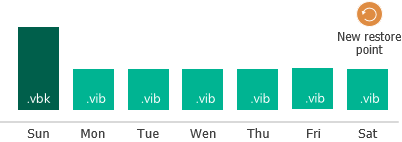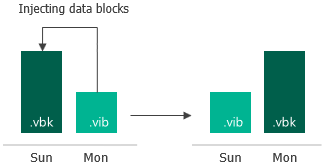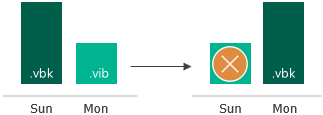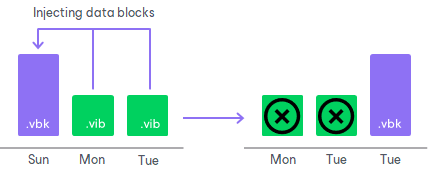Short-Term Retention Policy
Restore points in the backup chain are not kept forever. They are removed according to the retention policy. The retention policy helps maintain the life cycle of restore points and make sure that backup files do not consume the whole disk space.
Veeam Agent retains the number of latest restore points for the number of days defined by user. To define a retention policy for a backup job, you must specify the necessary number of days in the Retention policy field in the storage settings of the backup job. By default, Veeam Agent keeps the restore points for the last 7 days.
IMPORTANT |
For backup jobs created in Veeam Agent versions prior to 13.0.1, you could specify the number of restore points for the retention policy. In version 13.0.1, this option is deprecated. You cannot specify retention period in restore points for new jobs. Backup jobs created in Veeam Agent versions prior to 13.0.1 that use retention based on restore points will continue to work after you upgrade to Veeam Agent version 13.0.1. You can keep legacy restore point-based retention or change it to retention in days. If you choose retention in days, you cannot switch back to restore point-based retention. |
During every backup job session, Veeam Agent checks if there is any obsolete restore point in the backup chain. If some restore point is obsolete, it is removed from the chain. For details, see Removing Backup by Retention.
Consider the following for the daily retention policy:
- The minimum number of retained restore points is 3. This number does not depend on the number of days set in the retention policy. For example, the retention policy is set to 5 days. You launch the job after it was stopped for 10 days. Normally, Veeam Agent will delete all previous restore points. However, due to the minimum required number of retained restore points, you will still have at least 3 restore points in the backup chain: the newly created restore point and the two previous ones.
You can change the minimum number of retained restore points in the in the configuration file. For more information, contact Veeam Customer Support.
- To calculate the backup retention period, Veeam Agent counts every calendar day, even if no backup was created on that day. The day when the retention policy is applied is not included in the calculation.
In fact, Veeam Agent keeps the restore points for the N + 1 days, where N is the number of days you specify in the job settings. In this case, Veeam Agent removes the obsolete restore points after the N+1 days have passed. For example, if you set a retention policy to keep the restore points for 6 days, Veeam Agent will keep the restore points for 7 days and remove the obsolete restore points on day 8.
When the obsolete restore points are removed by retention, Veeam Agent transforms the backup chain so it always contains a full backup file on which subsequent incremental backup files are dependent. To do so, Veeam Agent uses the following rotation scheme:
- During every backup job session Veeam Agent adds a backup file to the backup chain and checks if there is an obsolete restore point.

- If an obsolete restore point exists, Veeam Agent transforms the backup chain. As part of this process, it performs the following operations:
- Veeam Agent rebuilds the full backup file to include in it data of the incremental backup file that follows the full backup file. To do this, Veeam Agent injects into the full backup file data blocks from the earliest incremental backup file in the chain. This way, a full backup ‘moves’ forward in the backup chain.

- Veeam Agent removes the earliest incremental backup file from the chain as redundant: its data has already been injected into the full backup file, and the full backup file includes data of this incremental backup file.

If the backup chain contains several obsolete restore points, the rebuild procedure is similar. Data from several restore points is injected to the rebuilt full backup file. This way, Veeam Agent makes sure that the backup chain is not broken, and you will be able to recover your data to any restore point.
